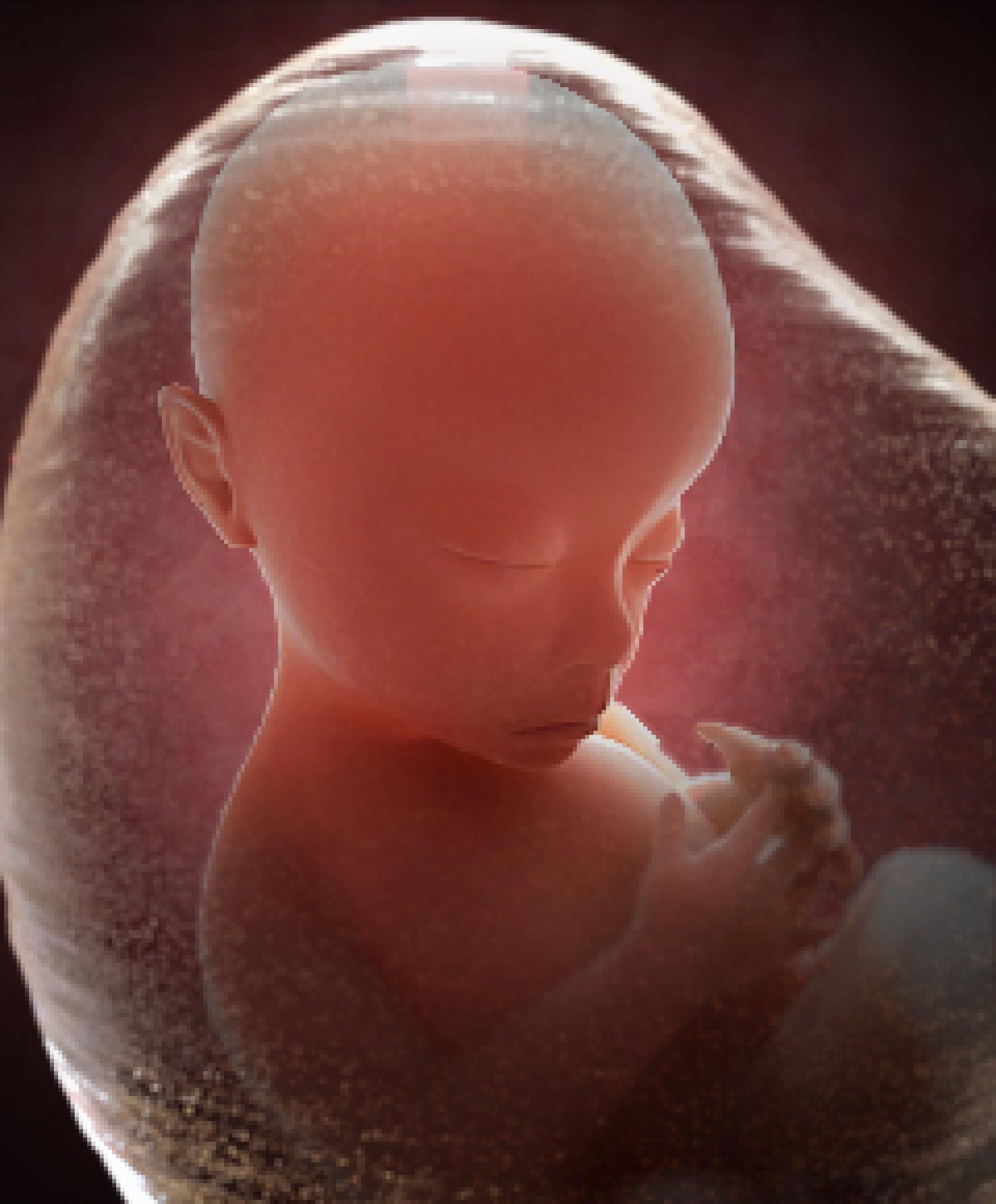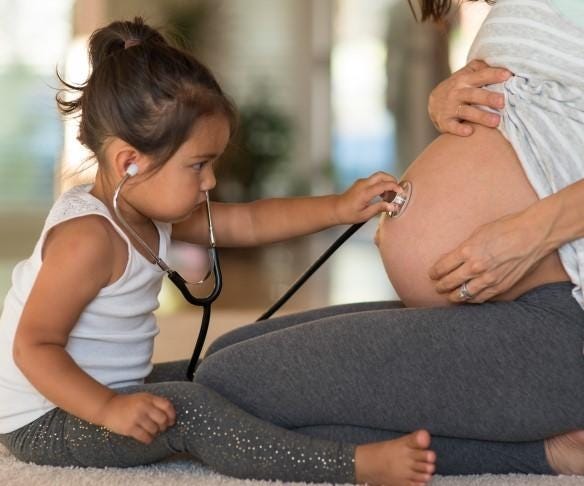 Like many women in this trimester, you may feel great energy, strength and happiness. You may not feel as much morning sickness, and your pregnancy starts to show.
Like many women in this trimester, you may feel great energy, strength and happiness. You may not feel as much morning sickness, and your pregnancy starts to show.
WEEK 19
Feeling the First Flutters
How Baby Grows
This week your baby will grow to about 5 or 6 inches and will weigh about 7 ounces by week's end.
This week, you may have the thrill of feeling your baby's first movements, called "quickening". If you've already had one child, you'll probably feel those first flutterings about two weeks earlier than you did in your first pregnancy, mainly because you know what sensation to look out for.
Your baby is also working on protecting their skin as they develop a waxy substance called vernix caseosa, which will disappear at birth. Vernix caseosa protects the growing skin from becoming chapped or wrinkled from floating in amniotic fluid.
How You Change
- Dizziness. Recurrent dizziness is common and nothing to worry about. If you feel dizzy when you stand up quickly, this might be caused by gravity rapidly draining blood from the brain. Standing up slowly will help with this problem.
- Also, when you're lying down on your back, your uterus may compress important blood vessels, causing lowered blood pressure and increased dizziness. You can help combat this by sleeping on your left side, which can allow better digestive functioning and may help lessen swelling in your arms and legs.
- Blood Sugar Fluctuations. Pregnancy also affects your blood sugar level. Eating a balanced diet of small, frequent meals and not skipping meals can help regulate your blood sugar.
- Childbirth Class. If you're a first-time parent or you'd like a refresher course, a structured class can help prepare you for labor and delivery. You'll want to be finished with class no later than 37 weeks, when you'll be considered full-term. Labor could start at any time from then on.
WEEK 20
Baby’s Halfway Home, and Getting Brainier Every Day
How Baby Grows
The 20th week is an important time for your baby's sensory development. Taste, smell, hearing, seeing, and touch are now developing. As existing nerve cells get bigger and make more complex connections with each other, the brain's production of additional nerve cells will slow.
Your little one now weighs about 9 to 12 ounces and has grown to about 6 to 8 inches in length. Your baby has come a long way since their first days as a microscopic collection of cells but has a lot more growing to do at birth.
Believe it or not, you're halfway there on the journey toward holding your new baby! Other baby developments this week include:
- Skin. Under the protective vernix coating, your baby's skin will continue to develop into three layers: the dermis, epidermis and subcutaneous layers.
- Nails and Hair. Your baby's nails and hair will continue to grow.
- Heart. Your baby's heartbeat will be stronger now, and the heart will beat about twice as fast as yours. You can hear it this week through a stethoscope.
- Increased Size. Your baby will take up more and more space in the uterus, and their continued growth will put more pressure on your lungs, stomach, bladder and kidneys.
How you change
- Increased Uterus Growth. Your uterus has reached your navel. If you're much bigger than normal your doctor may perform an ultrasound to see whether you're carrying twins or if your estimated due date is correct.
- Stretched Abdominal Muscles. The enlarging uterus will begin to stretch your abdominal muscles, and they may begin to pull apart as your baby grows.
- These muscles are attached to the lower part of your ribs and stretch down to the pelvis. You can see the separation more clearly if you lie down and raise your head, tightening the abdominal muscles—you'll notice a bulge in the middle of your abdomen. It isn't harmful or painful. After you give birth these muscles will return to their original place, and the separation will become less noticeable.
- Skin Itchiness. You may also notice your skin is getting itchy as the uterus grows and stretches the skin. Lotions may help soften skin and ease the itch.
- Belly Button Changes. Don't be surprised if your belly button has changed from an "innie" to an "outie" and starts to protrude. This change is a result of the pressure behind it. It will revert to close to its pre-pregnancy shape after delivery.
- Varicose Veins. Varicose veins are simply blood vessels that are filled with pooled blood. They usually appear in the legs or vulva.
- Wearing support hose, sleeping on your left side, and elevating your legs can help drain the veins. It's also a good idea to stay off your feet, wear flat shoes, and avoid crossing your legs. Varicose veins usually become less noticeable after delivery.
- Shortness of Breath. Some women have a bit of trouble catching their breath as their internal organs press against the lungs. This breathlessness will usually continue until the baby moves into position in the pelvis (“drops”). For first pregnancies, babies usually drop four to six weeks before birth. With subsequent pregnancies it occurs closer to when labor begins.
WEEK 21
Sleepy Time
How Baby Grows
Beginning this week, your little one's sleep begins to settle into identifiable patterns. You might be able to tell when they are sleeping if you notice that their movements slow down dramatically.
Some experts believe that your eating and sleeping habits, along with how much light and noise there is in your environment, all combine to help your baby synchronize their internal clock.
Here are some other developmental highlights that occur this week:
- Brain Growth. Your baby's brain will be growing very quickly, especially the structure deep in the center of the brain responsible for producing brain cells. This structure will disappear shortly before birth.
- Organ Maturity. Your baby's general growth pattern will slow down, but different organs will continue to mature, their heart will beat more strongly, and their legs will reach their correct proportions.
How you change
- Weight Gain. The average mom has now gained 10 to 15 pounds. You may put on as much as half a pound to a pound a week from now on.
- Breathlessness. If you're feeling out of breath around week 21, don't worry that you're out of shape. As your body continues to change to accommodate your baby and your expanding uterus further compresses your lungs, breathlessness can become more pronounced.
- Backaches. You may also notice your back aching a bit now, so it's a good idea to be conscious of your posture and take care to lift and carry properly.
WEEK 22
Baby Can Feel!
How Baby Grows
This week nerve endings become functional enough so that your baby can feel! They may experiment with this new sense of touch by stroking their face or feeling other body parts to see how they move. Your baby may stretch their muscles by pushing against the wall of your uterus with their feet or head.
Your baby weighs almost a pound now and is 7 to 8 inches long. Although they are filling out, their body still appears wrinkled because they lack a significant layer of fat beneath their skin.
In addition, your baby's liver is busy breaking down bilirubin, a substance formed by the breakdown of hemoglobin in blood cells. Because a baby's liver can only break down a limited amount of bilirubin, the excess is passed on to you through the placenta to filter in your liver.
Other developments taking place this week:
- Lips. Your baby will form distinct lips.
- Testes. If a boy, the testes, which have been tucked up inside the pelvis, will begin to descend into the scrotum this week, and immature sperm will form in the seminal vesicles.
- Eyes. Your baby's eyes will complete formation, although the iris (the colored part of the eye) will still lack pigment.
- Pancreas. Essential to insulin production, the pancreas will continue to develop steadily.
How You Change
- Weight gain. By now you may have gained 12 to 15 pounds. Starting this week you'll begin to put on weight more steadily, averaging about half a pound to a pound per week.
- Contractions. This week you may also begin to notice your uterus practicing for delivery with an irregular, squeezing sensation called Braxton Hicks contractions.
Braxton Hicks
The term refers to an irregular tightening of the uterus that may get stronger and longer as pregnancy progresses. Near the end of your pregnancy it may be difficult to tell the difference between strong Braxton Hicks contractions and true labor pains. If the contractions become painful or if you have more than four contractions in an hour, contact your doctor. Painful regular contractions may be a sign of preterm labor.





